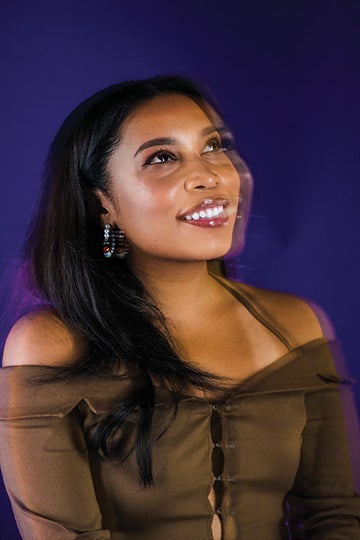Closing the Digital Divide
Jasmin Silva brings a passion for public service to a career in technology.

Connecting her formal education with a passion for public service has been the ongoing puzzle of Jasmin Silva’s ’16 life.
“I’m always thinking about how I’m going to apply that [academic education] to the underlying problem, which is how am I going to build equity in my country?” said Silva, who earned her bachelor’s degree in cognitive sciences. After Rice, Silva joined the Harris County Public Library’s (HCPL)growing engineering team. Going into that position felt like “learning how to walk,” she said. “I didn’t go into the space knowing what the needs were.”
Following a project of making library cards more accessible, Silva helped address the community’s digital needs that librarians had observed during the pandemic. “When COVID hit, they were seeing aggregate numbers of children just sitting outside of libraries,” Silva said. “They couldn’t open the doors to the libraries, and they were just trying to get access to the internet so that they could do their homework.”
Having access to the internet is, these days, your passport to society.
In response to these visible disparities, the program HCPL Connected was born and launched earlier this year, with Silva managing the program’s technical component. Because the library’s existing technology was primarily designed to check out books, Silva and her team developed a new application that could be used on the go. Supported by a $26 million federal grant from the Emergency Connectivity Fund — the largest ever given to a library system — HCPL Connected allows patrons to indefinitely check out Google Chromebooks and T-Mobile hot spots.
“Having access to the internet is, these days, your passport to society,” Silva said. “If you want to do any work in marginalized communities, you’re going to find yourself working more and more with digital literacy and digital access.”
This June, Silva moved to a new role as a technical program manager at Twitch, a livestream service focused on video gaming. “Before, I was trying to get people access to the internet. Now, I’m trying to make the internet safe,” Silva said. Though in Houston for now, Silva will be relocating to Seattle in the coming months.
A feeling of responsibility to help bridge the digital divide stems from Silva’s identity as a woman of color, she said, as well as from her parents, who both come from underserved communities. “Although I have been able to go to private school and get a private education, I’ve never been more than one step removed from the most disadvantaged portions of our society,” Silva said.
Putting that calling into action began at Rice, where Silva, a Sid Richardson College “Sidizen,” was Student Association president her senior year. “That was the first time that I felt like I had something to offer people around me. And it was the first time that I felt the joy of having purpose.”
As president, Silva established the Critical Thinking in Sexuality (CTIS) workshop for first-year students. “Getting that off the ground was the most impactful program I’ve taken on to date,” Silva said. That experience cemented Silva’s interest in pursuing public service. “I still get a deep sense of fulfillment and accomplishment when I think about CTIS, and I’ve tried to recreate this feeling through other projects that I’ve taken on since Rice.”
— Savannah Kuchar ’22
